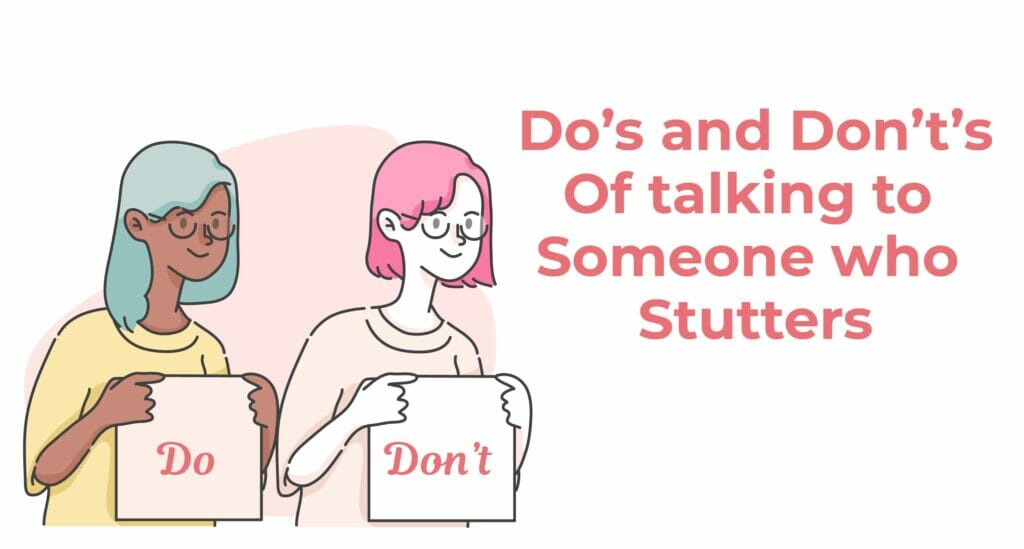Most of you have found Stamurai because you stutter, or you want to help a friend or family member who does. Speech exercises and motivational talk can help those who stutter, but it is incredibly important for those around them to create a support network.
To be supportive the first thing someone needs to learn is how to talk to someone who stutters. So, today’s post is slightly different – it is not just for those with speech dysfluencies, but for their families, friends, teachers and peers.
Why is this post important?
People who stutter are often perceived as less intelligent by the ones who have never experienced speech dysfluencies. It is far from the truth. Some of the most successful entrepreneurs, scientists and researchers, doctors and speech therapists, teachers and professors, actors and singers stutter when they speak.
It is time for us, the ones who don’t stutter, to change our opinion and perception about the ones who do!
How we address a person and converse with them says a lot about how much we value them and respect them. It is easy to say that we must never discriminate against someone with fluency issues, but it’s difficult to practice that. You may have a friend, family member, student or colleague who stutters. You might find it awkward at times to hold a conversation with them simply because you don’t know if you should finish their sentences, urge them to slow down or just be patient.
Well, let’s find out, shall we?

The do’s and don’t’s of talking to someone who stutters –
- DO NOT offer them speaking advice – “Maybe you should slow down”, “organize your thoughts before you speak”, or “maybe you should get some more rest” – are pieces of “advice” PWS have received thousand and one times. Although they might smile and nod when you offer your advice to them, it really does not help. In the case of people who are otherwise fluent, but experiencing some level of disfluency while talking, these are helpful advice. However, the causes of stuttering are multifaceted and slowing down does not get rid of one’s stuttering. In place of helping, you can come off as patronizing and condescending. It can end your conversation prematurely, change its direction or put the PWS off completely. So, no matter how much you have read about stuttering and the treatments for stuttering, please refrain from giving any advice when a PWS is trying to hold a conversation with you.
- Be patient – There is nothing a person wants more than to be heard. So, why try to rush a person through their speech or try to complete their sentences and find words for them, when they are sharing their thoughts and ideas with you. It happens more often with PWS that they’d like, and honestly, it’s more than just a tad bit disrespectful. They might even have a better knowledge of the language and a vibrant vocabulary, which you will never find out if you keep interrupting. The key to becoming a good friend or a strong part of one’s support system is by being a good listener. Maintain proper eye contact, don’t fill in for them, and just listen! Holding a successful conversation with someone who stutters is as easy as that.
- Don’t be afraid to ask twice – We know it can be difficult to understand what someone is saying especially if the person is experiencing too many blocks, repetitions and prolongations during the speech. Even therapists have to double-take at times to understand their clients. So, don’t just keep smiling and nodding your head if you don’t understand what a person with a stutter is saying. Asking them to repeat themselves for clarification just shows that you are invested in the conversation, and you have respect for their opinions/thoughts. Just be polite about asking the person to repeat that’s all. Something as simple as “pardon me, could you please repeat what you just now said?” or “I’m sorry, I quite didn’t catch that. Could you please say that again?” can be very effective.
- Focus on the matter of the conversation – Have you ever tried to hold a conversation with someone inside a bar, or in a school corridor? All you have to do is focus on what the person is saying and filter the noise out. You can use the same strategy to talk to someone who stutters. If you are really interested in a conversation, the repeats, blocks and prolongations will automatically mute themselves in your brain after a while and you will be able to hear what the person wants to say. While all you need to do is focus on the matter of the conversation, you need to acknowledge the fact that the speaker may take a couple more minutes to finish what they are saying due to their speech dysfluency.
- Accept that stuttering is NORMAL – Sometimes, we get too caught up in the definition of normal. With 70 million people around the world who stutter, it is nothing more or less than normal. It is up to the people with fluent speech to accept the fact that it’s indeed ok for people to stutter. It is a speech dysfluency that does not make a person any less capable, intelligent or knowledgeable than someone without speech problems. It is up to everyone to destigmatize stuttering.
Talking to someone who stutters should not be any different from someone who doesn’t. You need the same basic listening skills that you need to carry on any conversation in your daily life. As long as you remember to treat someone who stutters with the same respect as others, you will find it quite easy to hold a pleasant conversation with them.










